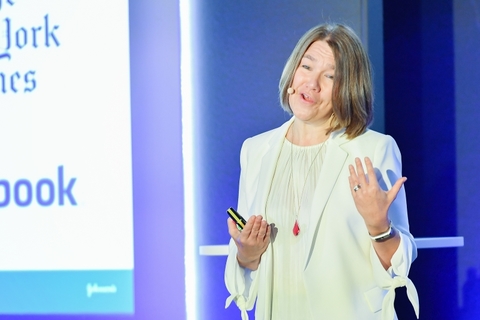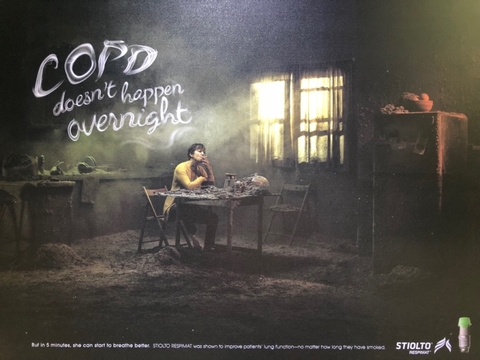CANNES, France—If you eavesdropped in Lions Health’s Palais II headquarters Tuesday morning, you heard a lot of chatter about who picked up awards the night before, and even more speculation on why. Outside in its sprawling cabana, Facebook was handing out sodas, water and trail mix along with client case studies. But onstage and in session, it was about patient-first marketing, data-gathering, technology tools and why we’ll all be friends with robots by 2028.
Meanwhile, speakers were talking up chatbots as a way to get valid health information to patients and even deliver basic care. If a pharma company can make that work, a Lions award might be in its future.
By Tuesday evening, it was down to the real scoop on what it’ll take for pharma work to win that elusive Grand Prix. Short answer: More than expert craft and more than a multichannel campaign.
Syneos: Can humor make a brand human?
Pharma is getting funny, and it’s working. That’s one Lions takeaway for attendees from Syneos Health, whose execs reflected on the sessions and shortlisted work in a cabana where staff was setting up for a party, but allowing visitors into its shade on sufferance. “I’m just excited to see pharma continue to experiment with its emerging humorous voice, and trying to figure out how to talk about healthcare in a light way,” said Leigh Householder, EVP and managing director of innovation and insight.
She listed a few examples on this year’s awards shortlist, including a Danish campaign for sunblock, Help Dave, featuring a woeful sunbather with unfortunate tan lines, and the Lions-winning social campaign for Takeda’s antidepressant Trintellix, created by McCann New York and Klick Health (see below). “We’re just starting to see how pharma brands are figuring out how to infuse a little bit of the humor our patients have, and I’m really liking it.”
“And it gives them a much more human voice because of it,” chimed in Sam Cannizzaro, executive creative director of GSW Advertising. “Humor makes it more youthful ... brands can feel more real, authentic, conversational, rather than using data point after data point after data point.”
AbbVie: Pharma gets ahead of the doctor visit
Drugmakers spend a lot of time persuading doctors their medications are the ones to choose for their diabetes or heart attack or cancer patients. But what about the people who purposefully avoid becoming patients, even when they have alarming symptoms?
AbbVie research has found that up to one-third of patients in the U.K. avoid going to the doctor because they’re afraid of what they’ll hear. In a session about the latest developments in their FOFO—Fear of Finding Out—awareness push, AbbVie’s Gwenan White rolled video featuring a middle-aged man who avoids doctors because he knows his shift-work schedule, his poor diet and his smoking aren’t good for his health.
That’s the idea behind AbbVie’s FOFO awareness push: How to help people get over their Fear of Finding Out and turn to a doctor for preventive care before chronic disease takes hold. “As an industry, there’s more we can offer [the healthcare system] than the conventional drugs and treatment,” White said.
1/3 if people don’t actively seek out help because of FOFO (fear of finding out)#lionshealth pic.twitter.com/1iCR02U5dC
— WPP Health & Wellness AUNZ (@wpphealthaunz) June 19, 2018
Animal health joins human health on the awards stage
Who let the dogs out at the Lions? Not just the dogs, but a whole bunch of animals made it onto the health awards docket this year. Elanco Animal Health won a silver lion in pharma for its whimsical print depictions of a dog and a cat with mouths as doors for pests as part of its “Be Wormwise” deworming product campaign for Milbemax in the U.K.
Meanwhile, in health and wellness, a Romanian power company’s campaign to get citizens to flag stork nests on top of utility poles—where they often would catch on fire—won a bronze lion. Enel Romania launched a social media app and campaign to enlist citizens to send GPS coordinates of each nest, allowing the power company to go out and protect the nests for more than 90% of the birds in danger.
J&J: Revamped baby line-up hints at a new marketing attitude
Johnson & Johnson Chief Marketing Officer Alison Lewis took center stage Tuesday to talk about the company's overhauled baby product portfolio, reconceived through the lens of “gentle.” As consumers worry more and more about chemicals in their products—and J&J continues to face lawsuits over its talcum powders— the company talked to 26,000 consumers around the world, brand fans and brand detractors alike, to find out what people wanted.
The answers? A reduced number of ingredients, naturally derived ingredients and no more dyes, she said. In other words, no gold baby shampoo and no pink baby lotion. The redesigned bottles and formulations are the result, with the new products set for relaunch in August, accompanied by new ads.
But the revamp also seems to be ushering in a new J&J attitude toward consumers, too. “In an era of skepticism, changing perceptions and changing that narrative is something we can’t do alone,” Lewis said. Rebuilding trust takes time and it’s not just about putting new products on the shelves and putting new advertising out there.
“I’m more optimistic than ever we can help parents feel safe and secure about the choices they’re making. Six weeks from now, we’ll find out in our first launch market whether they agree. And if they don’t, we’ll actually respond with humility and openness because that is what is different about how we behave today.”

Pharma jury recap: Ashy rooms, blue oceans and a call for pharma to bring it
For the final Lions Health session, several pharma jurors highlighted their favorite winners recognized Monday night. Renata Florio, executive creative director at Ogilvy Health and Wellness, chose Boehringer Ingelheim’s “Project Ash” for COPD drug Stiolto Respimat, which won a silver award. The campaign won for its print ads featuring meticulously crafted photos of smokers in ash-littered rooms, labeled with the millions of puffs it took to trigger their COPD.
AstraZeneca’s “The Attack” sparked conversation, too. The beautifully photographed short film recounts the day one man suffered heart attack while swimming in the ocean surf. The ad for clot-fighting drug Brilinta won a bronze award.
And while pharma did not win a Grand Prix, companies and their agencies have become really accomplished at one thing—craft. About two-thirds of the pharma shortlist were in craft categories such as illustration, photography, sound design, cinematography, user experience and user interface, said jury president Rich Levy, chief creative officer of FCB Health.
“We have elevated the craft work to such a level that I’m sure the craft work here could be entered anywhere in this festival—and I’m sure is entered in other places. So the next level is to take the insight and the craft and the emotion and the data and all that and smash it together, and that’s when we’re going to have a Grand Prix,” Levy said.

From the Cannes Lions Health judges’ desk: Parting advice
R. John Fidelino, executive creative director at Interbrand Health and head of the Health & Wellness jury this year had some advice for pharma companies looking to compete in 2019. Want to win? Integrate your communications.
“I’d love to see pharma think more about the interconnectivity of channels rather than spending so much time coming up with a key visual, which in and of itself is not enough. Pharma still looks at communication as its parts.”